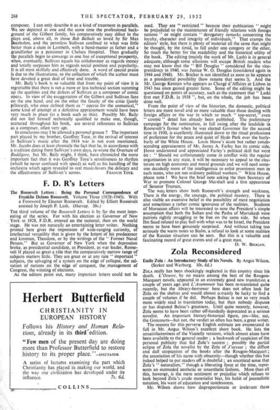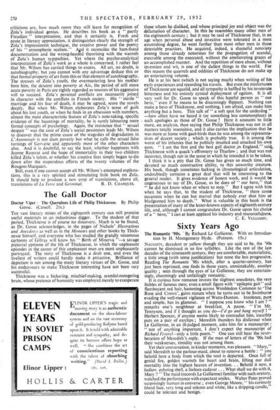Zola Reconsidered
Emile Zola : An Introductory Study of his Novels. By Angus Wilson. (Seeker and Warburg. 10s. 6d.) ZOLA really has been shockingly neglected in this country since his death. L'Oeuvre, by no means among the best of the Rougon- Macquart novels, appeared in an extremely good new translation a couple of years ago and L'Assammoir has been re-translated quite recently, but the library-borrower here does not often look for Zola on the shelves and would almost artainly be lucky to find a couple of volumes if he did. Perhaps Balzac is not so very much more widely read in translation today, but then nobody disputes or has disputed Balzac's greatness. Until quite recently, however, Zola seems to have been rather off-handedly deprecated as a serious novelist. An important literary-historical figure, yes—like, say, the Goncourts—but not, the verdict so often has been, a great writer.
The reasons for this perverse English estimate are enumerated in full. in Mr. Angus Wilson's excellent short book. He lists the unsatisfactoriness of the Vizetelly versions, which almost alone have been available to the general reader ; a backwash of suspicion' of the personal publicity that fed Zola 's success ' • possibly the partial eclipse of Zola the novelist by the Zola of J'aceuse ; the diffuse and dull utopianism of the books after the Rougon-Macquart ; the association of his name with obscenity—though whether this has indeed helped to put readers off is doubtful ; an uncritical sense that Zola 's " naturalism," though a liberating force at the time, repre- sents an outmoded aesthetic or unaesthetic fashion. More than all this, however, is the mere sentiment or prejudice which refuses to look beyond Zola's crude materialist bias, his habit of journalistic notation, his want of education and tastelessness.
Mr. Wilson shows how disproportionate or irrelevant these criticisms are, how much room they still leave for recognition of Zola's individual genius. He describes his book as a "partly Freudian" interpretation, and that it certainly is. Fresh and acute in literary appreciation, it distinguishes clearly the strength of Zola's impressionist technique, the creative power and the poetry of his "atmospheric realism." Aid it reconciles the ham-fisted documentation and the wrong-headed theorising with the warmth of Zola's human sygnpathies. Yet where the psycho-analytical interpretation of Zola's work as a whole is concerned, I rather feel that Mr. Wilson has carried things to excess. All art, no doubt, is autobiography, but you cannot with any advantage deduce this or that formal property of art from this or that element of autobiography. The stresses of Zola's youth, the overmastering love his mother bore him, the descent into poverty at Aix, the period of still more acute poverty in Paris are rightly regarded as sources of his aggressive will to succeed. Zola's personal conflicts are necessarily joined in character with the conflicts in French society. His " sterile " marriage and his fear of death, it may be agreed, score the novels deeply. But when Mr. Wilson elaborates Zola's sense of guilt about his lost youth, or when he finds in an obsession with numbers, almost the most characteristic feature of Zola's note-taking, specific evidence of the hauntings of mortality, he is surely labouring mere formal concepts of psychology. Again, the insistence that " sexual despair " was the core of Zola's social pessimism leads Mr. Wilson to discover that the prime cause of the tragedies of degradation in L' Assommoir is not slum poverty but what he calls the sexual false turnings of Gervaise and apparently most of the other characters also. And it is doubtful, to say the least, whether happiness with Jeanne Rozerat and the hope of immortality in their two children killed Zola's talent, or whether his creative fires simply began to die down after the stupendous efforts of the twenty volumes of the Rougon-Macquart.
Still, even if one cannot accept all Mr. Wilson's attempted explana- tions, this is a very spirited and stimulating little book on Zola. It should help to produce a new crop of translations, above all, translations of La Terre and Germinal. R. D. CHARQUES.



































 Previous page
Previous page